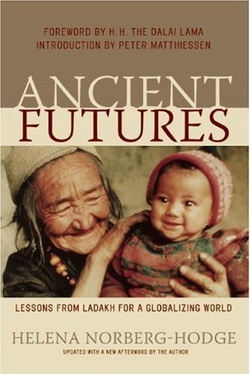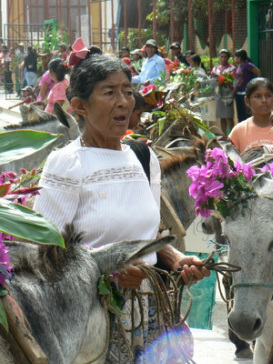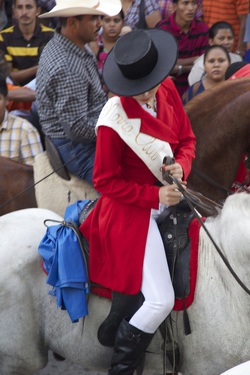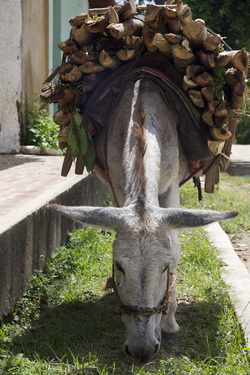 I am reading the book "Ancient Futures" and it captures beautifully what I have been thinking and experiencing here in Ocotal, and then a whole lot more. I am fascinacted by the book and I include a couple of excerpts here while I finish the last 50 pages. I could have waited, but what the author has to say seems too vital to wait. Home, Family and Communty I left home when I was eight to go to boarding school, and when I was 18 to work overseas, never to return home or to my family except for visits that could be measured in days rather than weeks. Helena writes: "...,I had thought that leaving home was part of growing up, a necessary step toward becoming an adult. I now believe that large extended families and small intimate communities form a better foundation for the creation of mature, balanced individuals. A healthy society is one that enoucrages close social ties and mutual interdependence, granting each individual a net of unconditional support. Within this nurturing framework, individuals feel secure enough to become quite free and independent."  An indigenous woman and her donkey in Ocotal An indigenous woman and her donkey in Ocotal The Impact of "Development" I am reading the book for two reasons: I am proposing to co-design a gender equality program for a series of 17 rural communitities; and we are about to launch a new diploma course in the Institute: "Leadership, Gender, and Culture". Helena talks a lot about the destruction of local culture through well-intentioned but occasionally thoughtless and often misguided development people. She quotes the Development Commissioner in Ladakh in 1981: "If Ladakh is ever going to be developed we have to figure out how to make people more greedy. You just can't motivate them otherwise." I took a metaphorical double take when I read that quote. 1981 was just when India was providing development support to open the region up for tourism. Sadly, development with its "messengers of development - tourists, advertisements, and film images" end up destroying local culture and sustainable practices. "Development is stimulating dissatisfaction and greed; in so doing , it is destroying an economy that had served the Ladakhis for more than a thousand years." Helena does not romanticize the old ways vs. the new, but she does actively question if there is not a blended solution to development (that's the part I am just reading).  The "mascot" of last year's horse parade The "mascot" of last year's horse parade How We Measure "Poor" The institute is part of a national discussion of how to define "poor" and what should be considered in determining if someone is poor or not. The traditional measure of social welfare of one country over another is often based on GNP. Helena writes: "Whether in remote subsistence economies or in the heart of the industrialized world, there is clearly something wrong with a system of national accounting that sees GNP as the prime indicator of social welfare. As things stand, the system is such that every time money changes hands - whether from the sale of tomatoes or a car accident - we add it to GNP and count ourselves richer. Policies that casue GNP to rise are thus often pursued despite their negative impact on the environment or society. A nation's balance sheet looks better, for instance, if all forests have just been cut to the ground, since felling trees makes money." This method of calculating "poor" and therefore spurring on "development" efforts leads to enthusiastic "development" and "modernization" which tend to be the same as "Westernization" and "industrialization", as described by Helena: "...the interaction of a narrow economic paradigm with continual scientific and technological innovation. The process has grown out of the past centuries of European colonialism and industrial expansion, through which our diverse world has been shaped by an increasingly uniform economic system - one that is dominated by the powerful interests of the industrialized countries, the multinational corporations and the Third World elite."  A donkey carrying cooking fuel A donkey carrying cooking fuel Those last few words catalyzed another metaphorical double-take. And got me thinking about something a friend said in the street while we watched this year's horse parade. All the riding clubs, schools and horse training centers bring out their prize horses and put them on display in a wonderfully and typically disorganized parade - quintessentially rural, central-american, small town. The riders were mostly the rich elite. The streets were filled with a mixture of people of all social levels, and the remaining rich elite in stands along the parade route, drinking from open bars. My friend, a peace-corps worker, had invited her host family to come with her to the parade. The family wouldn't go, it was only for "rich folk". My friend pointed out the parade was free. "Ah, but the children will want me to buy the things for sale along the street that I can ill afford. Rich folk's things. They will not be happy." My heart sank, saddened that such a lively event should be beyond the reach of so many in such a subtle way, something that would never have occurred to me. And I thought back to Helena's book...and the rest of the parade didn't seem quite so jolly.
1 Comment
|
BackgroundI sold house, car and most of my furniture to move to the small town of Ocotal in Las Segovias on the Honduras/ Nicaragua border. Archives
March 2014
Categories |
Contact© Copyright 2018 Richard Richards, Bournemouth, Dorset, UK
|

 RSS Feed
RSS Feed
